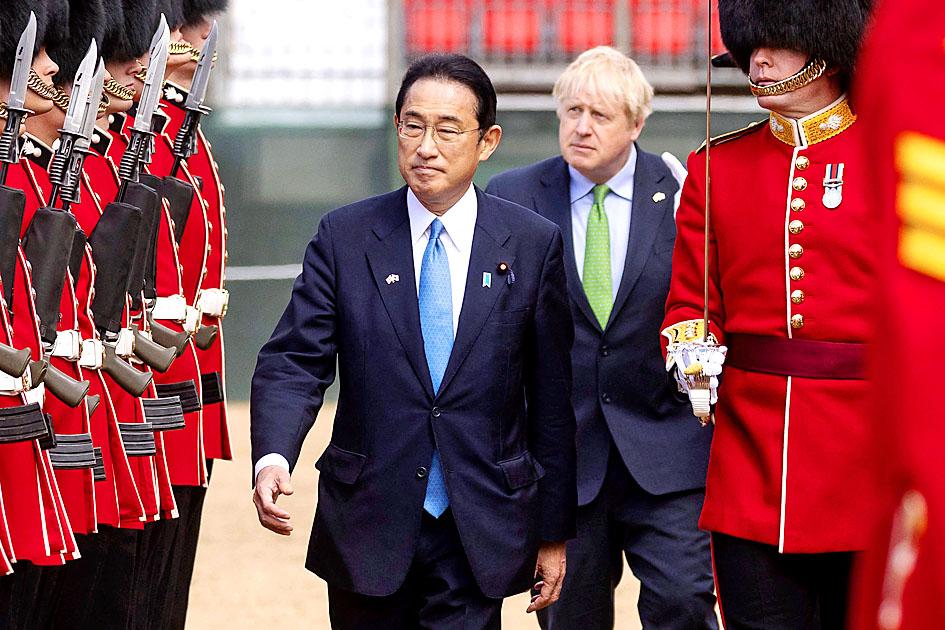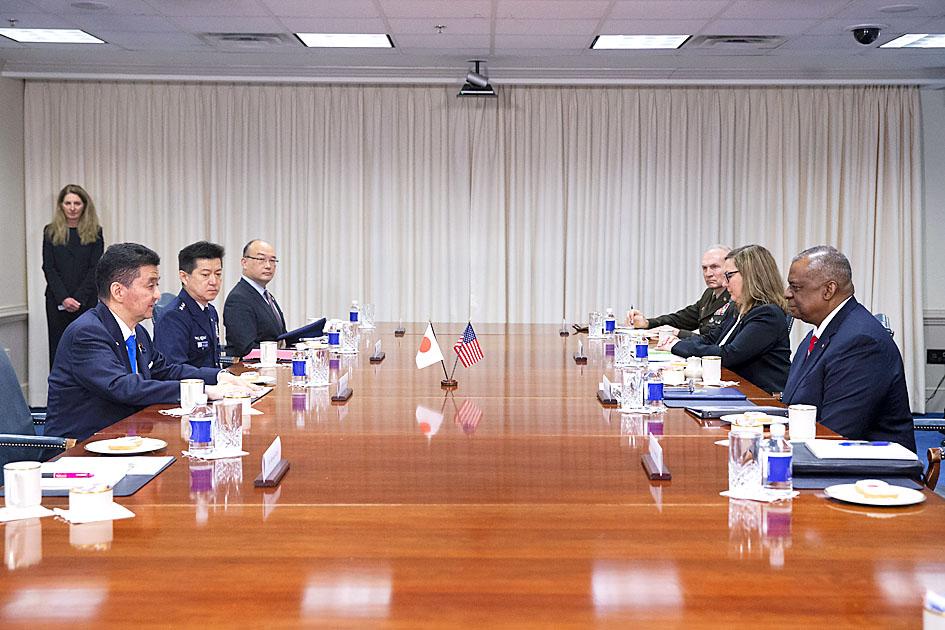Japanese Prime Minister Fumio Kishida on Thursday warned that the invasion of Ukraine could be replicated in East Asia if leading powers do not respond as one, saying that peace and stability in the Taiwan Strait must be maintained.
Kishida, speaking in London through a translator after a meeting with British Prime Minister Boris Johnson, said now was the time for G7 nations to solidify their unity.
“Collaboration among countries sharing universal values becomes ever more vital,” he said. “We must collaborate with our allies and like-minded countries, and never tolerate a unilateral attempt to change the status quo by the use of force in the Indo-Pacific [region], especially in East Asia.”

Photo: AFP
“Ukraine may be East Asia tomorrow,” he added.
“Peace and stability in the Taiwan Strait is critical not only for Japan’s security, but also for the stability of international society,” Kishida said. “Japan maintains its position to expect a peaceful resolution through dialogue to issues surrounding Taiwan, and the situation will be watched carefully from that perspective.”
In Taipei, Ministry of Foreign Affairs spokeswoman Joanne Ou (歐江安) yesterday thanked Kishida for his comments, saying they “not only reflect the aspirations of democratic countries, but also win the recognition and approval of the international community.”

Photo: EPA-EFE
Chinese Ministry of Foreign Affairs spokesman Zhao Lijian (趙立堅) said that Japan was exaggerating a perceived threat from Beijing as an excuse to boost its military might.
“If Japan really wants peace and stability in East Asia, it should immediately stop provoking confrontation between big powers and do more to help increase the trust between regional countries, and promote regional peace and stability,” Zhao told a regular news briefing in Beijing.
During the London meeting, Johnson announced that the militaries of the UK and Japan would “work more closely together’” under a defense deal.
Kishida also announced new sanctions, including an asset freeze on 140 Russians and the expansion of an export ban to include Russian military firms.
Kishida’s Liberal Democratic Party has also proposed a substantial increase in defense spending — possibly to an amount on par with 2 percent of GDP, up from 1 percent — and the development of the capacity to attack missile-launching sites in an enemy’s territory.
In Washington, Japanese Minister of Defense Nobuo Kishi and US Secretary of Defense Lloyd Austin on Wednesday vowed to defend the rules-based international order in a meeting at the Pentagon.
The US and Japan would enhance cooperation to oppose China’s expansionism in the East and South China seas to prevent any change by force to the “status quo” in the region, they said.
The countries are to counter threats emanating from Russia’s invasion of Ukraine and North Korea’s nuclear tests, they added.
Tokyo is to revise its National Security Strategy to allow the possession of counterstrike capabilities against long-range missiles before the end of the year, Kishi said.
Austin was quoted by the Pentagon as saying that the US reaffirms “unwavering commitment to the defense of Japan to include our extended deterrence commitments using our full range of conventional and nuclear capabilities.”
Additional reporting by Lin Tsuei-yi and Jonathan Chin, with CNA, AP and the Guardian

Right-wing political scientist Laura Fernandez on Sunday won Costa Rica’s presidential election by a landslide, after promising to crack down on rising violence linked to the cocaine trade. Fernandez’s nearest rival, economist Alvaro Ramos, conceded defeat as results showed the ruling party far exceeding the threshold of 40 percent needed to avoid a runoff. With 94 percent of polling stations counted, the political heir of outgoing Costa Rican President Rodrigo Chaves had captured 48.3 percent of the vote compared with Ramos’ 33.4 percent, the Supreme Electoral Tribunal said. As soon as the first results were announced, members of Fernandez’s Sovereign People’s Party

MORE RESPONSIBILITY: Draftees would be expected to fight alongside professional soldiers, likely requiring the transformation of some training brigades into combat units The armed forces are to start incorporating new conscripts into combined arms brigades this year to enhance combat readiness, the Executive Yuan’s latest policy report said. The new policy would affect Taiwanese men entering the military for their compulsory service, which was extended to one year under reforms by then-president Tsai Ing-wen (蔡英文) in 2022. The conscripts would be trained to operate machine guns, uncrewed aerial vehicles, anti-tank guided missile launchers and Stinger air defense systems, the report said, adding that the basic training would be lengthened to eight weeks. After basic training, conscripts would be sorted into infantry battalions that would take

GROWING AMBITIONS: The scale and tempo of the operations show that the Strait has become the core theater for China to expand its security interests, the report said Chinese military aircraft incursions around Taiwan have surged nearly 15-fold over the past five years, according to a report released yesterday by the Democratic Progressive Party’s (DPP) Department of China Affairs. Sorties in the Taiwan Strait were previously irregular, totaling 380 in 2020, but have since evolved into routine operations, the report showed. “This demonstrates that the Taiwan Strait has become both the starting point and testing ground for Beijing’s expansionist ambitions,” it said. Driven by military expansionism, China is systematically pursuing actions aimed at altering the regional “status quo,” the department said, adding that Taiwan represents the most critical link in China’s

EMERGING FIELDS: The Chinese president said that the two countries would explore cooperation in green technology, the digital economy and artificial intelligence Chinese President Xi Jinping (習近平) yesterday called for an “equal and orderly multipolar world” in the face of “unilateral bullying,” in an apparent jab at the US. Xi was speaking during talks in Beijing with Uruguayan President Yamandu Orsi, the first South American leader to visit China since US special forces captured then-Venezuelan president Nicolas Maduro last month — an operation that Beijing condemned as a violation of sovereignty. Orsi follows a slew of leaders to have visited China seeking to boost ties with the world’s second-largest economy to hedge against US President Donald Trump’s increasingly unpredictable administration. “The international situation is fraught